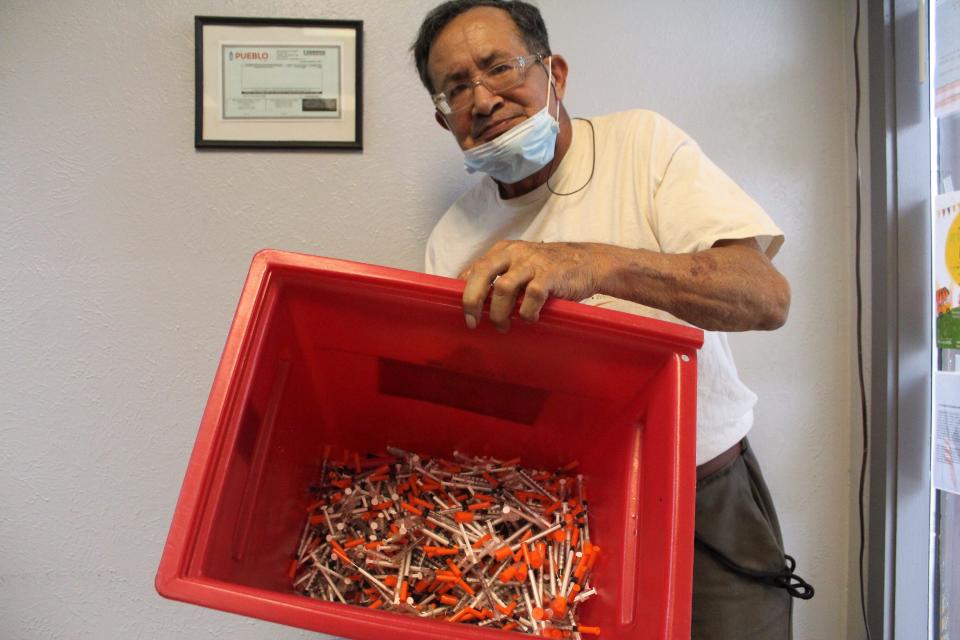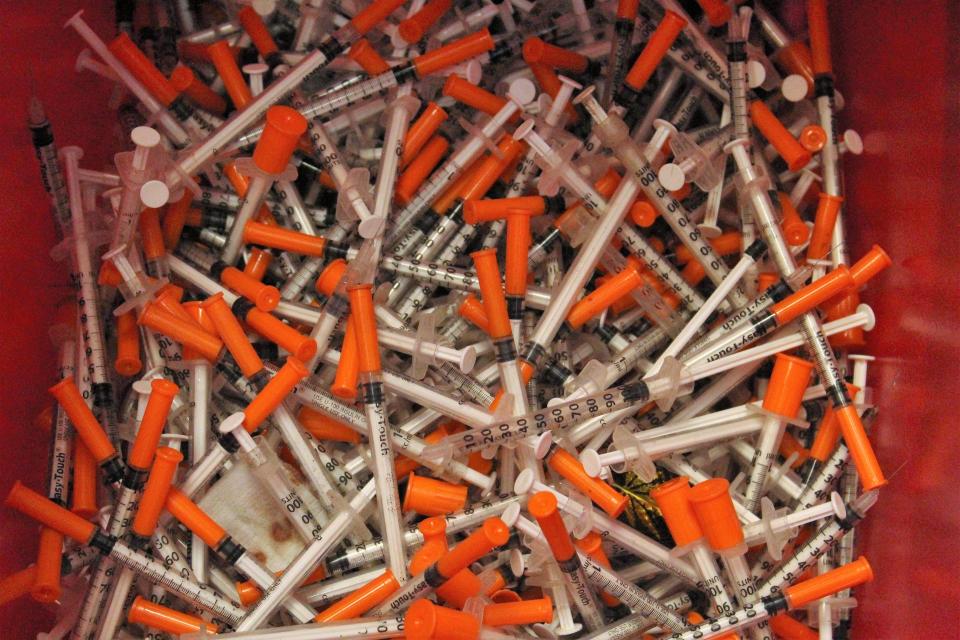'Trying to make sure people survive': Needle exchanges ponder future as Pueblo weighs ban
Frankie Arteaga remembers what Pueblo was like when it had no facility for addicts to exchange dirty syringes for clean ones.
He and Dr. Michael Nerenberg walked around Pueblo, picked up used needles in alleys and parks here and there and exchanged fresh ones with people who needed them.
Their outreach did the job but was easily outmatched in efficiency once clean syringe access programs opened up in the Steel City with centralized locations.
Now, Arteaga ponders what Pueblo might again look like without those programs.
“Can you imagine if these needles were spread out through Bessemer?” Arteaga said as he looked into a bin containing between 800 to 1,000 dirty needles.
More on needle exchanges in Pueblo: Are needle exchange programs harmful to the Pueblo community? Here's what the data shows

All of those needles were inside the Southern Colorado Harm Reduction Association’s facility in Bessemer, where dozens of people come each Thursday to obtain clean needles and visit staffers who advocate for harm reduction strategies.
“It’s just proof against saying they’re all over (Pueblo),” Arteaga said. “They’re all over here.”
In recent weeks, Arteaga and other staffers have been left to ponder the program’s future. An ordinance prohibiting needle exchange and distribution services is expected to be considered by Pueblo City Council at its May 13 meeting.
The ordinance defines creating or participating in needle exchange programs as a “nuisance.” People who violate it could incur fines and potential jail time if they are considered habitual offenders.
SCHRA and Access Point Pueblo are the two organizations that operate syringe access programs in the city. Data from the Centers for Disease Control and Prevention show that those types of programs reduce the spread of blood-borne infections. Advocates say they also help refer people experiencing drug addiction to treatment, among other benefits.

But the data has seemingly fallen on “deaf ears” among some of Pueblo’s current leaders, said Danielle Harwell, program development and wellness specialist at SCHRA. Councilor Roger Gomez brought forth the ordinance that may ban the programs within city limits and previously said that he feels they “enable” drug usage.
"Another thing I always hear (is), 'These folks are human,'" Gomez said. "Well, so are taxpayers. And they have to put up with crime, homelessness (and) poverty, and it's in those areas where they are most prevalent as opposed to other districts in Pueblo."
That sentiment is shared by Pueblo County Commissioner Eppie Griego, who last year claimed Pueblo’s needle exchange programs promote illegal drug use.
“I feel shocked that we’ve gone back this far and that we continue to take steps backward when we already know what these steps forward look like,” Harwell said. “If anything, we should be bolstering these services for these people.”
“They (city leaders seeking to ban needle exchanges) are not just taking away the needles, they’re taking away our opportunities to change our lives.”
Crash Lovellette
The impact of needle exchange programs on Pueblo
Crash Lovellette has spent the past seven years in Pueblo, spending some of it struggling with a drug addiction. He visits the SCHRA’s Bessemer facility every Thursday to pick up clean needles as he seeks help to recover from it.
“It’s hard to talk about, man,” Lovellette said. “I’m trying to fix myself because I’m not living life with the way I’m living because of drugs. That’s all I can say about that. It’s sad.”
The facility has been a place of solace amid his fight to tackle his addiction. He’s been offered food during his visits and often speaks with a staffer for one-on-one sessions. He called it “inspiring” to see staff members living “a successful life.”
“If I didn’t have this place, I’d probably be going to prison right now,” Lovellette said of SCHRA. “They (city leaders seeking to ban needle exchanges) are not just taking away the needles, they’re taking away our opportunities to change our lives.”
One point that some advocates have repeated over the past several months is how the programs help prevent overdose deaths. Harwell said that point “gets to the heart” of the matter.
“We’re trying to make sure people survive,” Harwell said.
In January, SCHRA collected 2,507 syringes and another 2,486 in February, according to data provided to the Chieftain. In March, that number was 1,536. The program collects thousands of dirty needles that are disposed of at the facility throughout the year, by around 300 people per month and 70 to 90 people per week.
“The thing with old needles is not just that they’re contaminated, it’s that the tip actually gets damaged every time you use it,” said John Emahiser, a resident physician and co-founder of Project Apollo Street Medicine, a Pueblo nonprofit that focuses on harm reduction.
“So, every time that happens, you get the risk of a bit of needle breaking off inside your arm or causing more trauma going in. It’s just a recipe for all sorts of infection and (other issues).”
Concerns remain about fallout of eliminating the program
Harwell said SCHRA staff plan to “continue to do what we can while we can” until a decision is made about the ordinance. Jude Solano, co-founder and CEO of SCHRA, told the Chieftain that she believes eliminating syringe access programs could lead to a rise in people who become HIV and hepatitis C positive in Pueblo.
"We do not have a huge HIV positive and hep C positive (population)," Solano said. "We have gotten those things under control since we have been here because we deliver clean supplies to people.”
Data from the Colorado Department of Public Health and Environment show there were 128 and 132 newly reported chronic cases of hepatitis C in Pueblo County in 2018 and 2019, respectively. In 2021, that number was 70 before increasing to 83 in 2022.
It’s unclear how the upcoming vote may go, but it’s possible multiple speakers will come forward before the ordinance is voted on to speak for and against it. It’s been a hot-button issue in Pueblo over the past year — opponents and advocates have spoken during public comment about it at several city council meetings.
“Every day is not promised out here,” Lovellette said. “(At SCHRA), there’s some hope.”
Chieftain reporter Josué Perez can be reached at JHPerez@gannett.com. Follow him on X, formerly Twitter, at @josuepwrites. Support local news, subscribe to The Pueblo Chieftain at subscribe.chieftain.com.
This article originally appeared on The Pueblo Chieftain: Will Pueblo ban needle exchanges? City council to decide Monday
